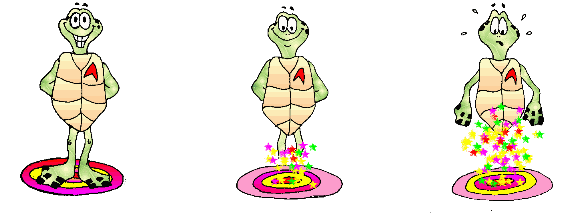

When Turtle Trax began, there were few sea turtle links on the Web, and the search engines were not as thorough as they are today. A search at Google recently got over 118,000 hits for "sea turtle"--and that number is growing. Now the problem isn't finding sea turtle references, it's figuring out which ones are worth visiting.
We can't review 118,000 links, but we can point you at pages that we've visited and found worthy of note. The links below are in no particular order, unfortunately.
We last tested all of these links on February 16, 2002, or to be correct, Laura did it for us. (Thanks Laura!) As you know, the nature of the Web is such that links change all the time. If you find that one of these links no longer works, please do as Laura did and send email to:
webmaster@turtles.org (Peter Bennett)
Anyone interested in marine turtle tumors must see this page, which is a scientific description of the fibropapillomatosis of marine turtles. This department of the UFL is at the forefront of research into marine turtle fibropapilloma tumors.
TURTLE SACRIFICE TO THE TEMPLE GODS IN THE PENGHU ISLANDS OF TAIWAN by George H. Balazs, I-Jiunn Cheng, and Hui-Chen Wang, is the web version of the paper presented at the 19th Annual Sea Turtle Symposium in South Padre, Texas. This is an illustrated description of the visit by Cheng, Wang, and Balazs to the PengHu Islands of Taiwan, and demonstrates that "the cultural heritage relating to sea turtles is diverse, deep and significant."
We never realized how many phone cards featured sea turtles until we got email from Ilonka and Corina of The Netherlands. They've got a huge collection of phone cards online at www.ilcoweb.com. The link to the turtle phone card collection is the first one on the left.
The Chelonian Research Foundation publishes the prestigious Chelonian Conservation and Biology, International Journal of Turtle and Tortoise Research. This is the only international scientific peer-reviewed journal tha covers all aspects of conservation and biology of all chelonians, including marine turtles, freshwater turtles, and tortoises. A subscription to this journal is a valuable asset to anyone interested in turtles.
You can find a wealth of sea turtle images online at seaturtle.org's Sea Turtle Image Library, sorted into categories that include species, threats, and galleries by contributor. Many images are available in large format and are accompanied by copyright information.
The Tampa Bay Tour of Turtles was developed with the goal of helping to educate people about marine turtles and the work done at the Clearwater Marine Aquarium to rescue, rehabilitate and release them. Artists and groups have sculpted and painted loggerhead turtles to be placed all around Tampa Bay this summer. If you can't be there, do the next best thing: take the Tour on the web!
John Levell's website is your online source for all things Chelonian, not just sea turtles. Of course, he has a fine selection of marine turtle literature.
Although the name says "Center for Cetacean Research and Conservation" and the host site is whaleresearch.org, this is also the home on the web for the sea turtles of the Cook Islands. This site is a must-see for its amazing video clips alone, but there is lots more to keep your interest.
Ocean Ambassadors have an interesting and comprehensive collection of pages that include facts about sea turtles, a description of their habitat in the Phillipine-Sabah Turtle Islands, threats to turtles, and of course, satellite tracking pages.
That's the name Bertha Wise has chosen for her terrific series of pages of information about all kinds of turtles and tortoises. We often get email asking us for advice about pet turtles and tortoises, but we are sea turtle people. Thanks to Bertha, we now have a page we can recommend as an excellent starting point for finding that sort of advice.
The U.S. National Marine Fisheries Service Office of Protected Resources has started to post copies of the proceedings of the Annual Symposia on Sea Turtle Conservation and Biology. The documents are in Adobe Acrobat (PDF) format, and you can read them either on the web with the Acrobat plug-in for your browser, or on your own machine with the free Acrobat Reader. Whatever your choice, these documents are a valuable resource.
This is the only facility of its kind in North Carolina. The people of the Karen Beasley Center take justifiable pride in being known as "the wound care specialists." We've met several of the people who work there, and we can personally vouch for their dedication and compassion. We take great joy in welcoming The Karen Beasley Sea Turtle Rescue and Rehabilitation Center to the Web.
Education World, the site "where educators go to learn", has prepared a suggested lesson plan that features sea turtles. Entitled "Tracking Sea Turtles: Lessons in Saving an Endangered Species", the plan includes links to Turtle Trax and numerous other sea turtle web sites. Even if you're not a teacher or student, this is a delightful summary of the wonderful sea turtle web resources that are available. Don't miss it!
As part of its mission to educate people about coral reefs, the Hawaii Coral Reef Network promotes research programs such as the sea turtle research at Punalu'u, Hawaii. George Balazs of the US National Marine Fisheries Service, Marc Rice of Hawaii Preparatory Academy, and students from the Marine Option Program at the University of HAwaii, Hilo, work together to conduct research on the local population of Hawaiian green turtles.
Michael Coyne keeps an informative set of pages at seaturtle.org. Michael is the coordinator and online host of the Marine Turtle Newsletter. He also provides plenty of other highly useful resources.
South Padre Island is a familiar name to anyone who has spent time looking into the history of sea turtle research. One of the reasons is the Turtle Lady of South Padre Island, Ila Loetscher, founder of Sea Turtle Inc. Learn more about this amazing lady and her legacy at the Sea Turtle Inc. web pages.
1998 was the International Year of the Ocean, and the US agency NOAA has created a web site dedicated to celebrating this fact. One set of pages comprise a comprehensive set of Sea Turtle facts, but even more interesting are the colouring pages for kids (of all ages).
HEART has long been working on behalf of the critically endangered Kemp's ridley. HEART's web pages include a "breaking news" page, a stranding report for the Gulf Coast, and much more. Make sure you drop by and explore.
Leatherback Data Central, hosted by Drexel University, provides the latest information about the status of the leatherback turtle and the projects of the Leatherback Task Force.
Turtle Time Inc. is a not-for-profit organization dedicated to the continued survival of loggerhead sea turtles. Turtle Time operates in Florida from Fort Myers Beach to the Lee-Collier County line, patrolling nesting beaches and handling stranded turtles. Turtle Time also maintains an excellent page that you shouldn't miss.
Pelican Bay Trading Company has sponsored a page that features a description of the Turtle Watch Program of Ocean Isle, some interesting sea turtle facts, and during the nesting season, a diary recording the progress of several loggerhead nests.
Last Chance Lost?, by Peggy and Sam Fosdick and published by Irvin S. Naylor, describes the turbulent history of the Cayman Islands Turtle Farm. It's also a good summary of sea turtle conservation over the years. While we don't agree that the concept of turtle farming is the solution to sea turtle conservation, we do recommend the book. It's well written and although it clearly favours one side of the debate, it does a good job of presenting both sides and is certainly thought-provoking. Now you can order the book online by visiting Irvin. S. Naylor's homepage.
Turtle Trax welcomes EuroTurtle to the World Wide Web. Exeter University (UK), King's College Biology Department in Somerset (UK) and MEDASSET (Mediterranean Association to Save the Sea Turtles) have collaborated to build the first web page in Europe that is fully devoted to sea turtle conservation, with a large emphasis on education.
Nancy Linsley and George Balazs have collaborated to create Sea Turtle Postage Stamps of the World, a page that attempts to collect and catalog every known postage stamp that depicts a sea turtle. The site is organized by country, which is not how Howzit would do it (69K JPEG). It features a wealth of information about the stamps, including scanned illustrations.
The Sea Turtle Preservation Society is a group of volunteers in Brevard County, Florida, which is also home to the Archie Carr National Wildlife Refuge. They contribute to the Sea Turtle Stranding Network, do Turtle Watches during the nesting season, and are dedicated to education on sea turtle biology and conservation.
The Caribbean Conservation Corporation has begun creation of a promising Web site that features, among other things, several pages of information on each of the turtle species found in the Caribbean. Turtle Trax was proud to play host to the CCC Web page until their new site opened, and extends a hearty welcome.
The Sea Turtle Restoration Project has a series of pages that describe their efforts to protect marine turtles around the world. The STRP is one of the organizations that we recommend you support in How You Can Help.
The November '95 issue of Islander features Endangered Species, a story about Hawaiian green sea turtles and their plight which just happens to recommend Turtle Trax as a good resource for further information about sea turtles--but you already knew that.
The August '95 issue of the South Florida Dive Journal contains a beautiful photo essay by Sandra Edwards and an illustrated interview with Norine Rouse. Not to be missed.
EarthWatch is an organization that sponsors numerous projects to study and protect the environment. Here's a list of their projects that affect marine turtles.

